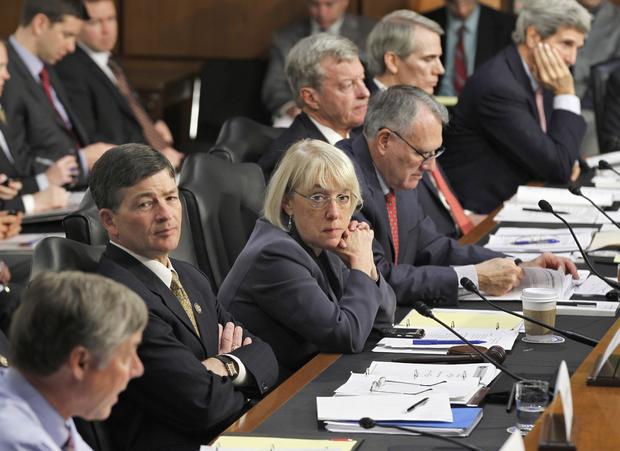Can the supercommittee save the economy?
It may sound like hyperbole, but the 12-member congressional group tasked with finding huge budget savings in the next few weeks says its job essentially amounts to fending off another major fiscal crisis - and essentially saving the economy as a whole. Choose the wrong path, however, and they could only make the nation's economic problem worse, some members of the so-called "super committee" worry.
"These aren't just numbers on a page," Sen. Patty Murray, D-Wash., the committee co-chair, said at the group's public hearing today with respect to the federal budget. "They affect real people in real ways. When food assistance for women and infants is cut, that means greater challenges for struggling families. When infrastructure investments are shelved, that means fewer jobs and more crumbling bridges and roads."
The group of six Democrats and six Republicans is charged with finding at least $1.2 trillion in budget savings by November 23. That figure would be a feat in and of itself, given how hard it is for members of Congress to find common ground between their vastly different ideological views, or to even remove politics from the discussion.
Furthermore, in addition to finding common ground on tax increases and spending cuts -- the two obvious ways to achieve budget savings -- the committee has something of a new mandate to help the struggling middle class, in the face of the continuing "Occupy" protests.
"All this obfuscation with percentages of GDP, this is just trying to confuse the issue," one protester shouted at the congressmen today before she was escorted out of the hearing by the police. She called on Congress to raise taxes on the wealthy and end the wars on behalf of "the 99 percent," referring to Americans who aren't among the top wealthiest one percent.
Even if it were possible for the group to agree on $1.2 trillion in savings, that may not be enough, several people have warned.
Sen. John Kerry, D-Mass., said today that if the committee doesn't shoot higher, "we're going to be back here in about a year or two, or three at maximum, dealing with the very same issues that are on the plate now about the unsustainability of our budget."
The committee's meetings have been largely-closed door, but reports suggest there's been little progress so far. Today's hearing focused on the discretionary portion of the budget, even though mandatory spending on programs like Medicare is eating up an ever-increasing portion of the federal budget. Rep. Jeb Hensarling, R-Texas, the committee's other co-chair, lamented that today's meeting amounted to "debating the pennies, nickels and dimes in a debt crisis that is demanding half- dollars and dollar bills."
Still, members today expressed optimism about their mission. "We aren't there yet, but I am confident that we are making progress, and I'm hopeful that we are moving quickly enough to meet our rapidly approaching deadline," Murray said.
Reuters reports that Democrats in a closed-door meeting yesterday put forward a plan for $2.5 trillion to $3 trillion in savings, achieved through an equal mix of spending cuts and revenue increases. The plan reportedly includes between $200 billion and $300 billion in new stimulus spending, which would be paid for with lower interest payments from reducing deficits.
"We need to address the large, long term drivers of our unbalanced federal budget," Murray said today. "But I also really believe that we have to take steps to strengthen that economic recovery and address the jobs crisis that we're seeing today."
She pointed out that the nonpartisan Congressional Budget Office (CBO) has lowered its projections for economic growth for 2011 and 2012 since August. CBO Director Doug Elmendorf, the hearing's one witness, confirmed to Murray that a "reduction in government spending will generally reduce the demand for goods and services. Either because the government is buying less itself, or because it's providing lower transfers to individuals to purchase goods themselves."
Elmendorf said that "it's a widespread view among analysts that lack of demand for goods and services is the key factor holding back the recovery."
It's clear, however, that Republicans won't be quick to sign on to any Democratic plans for stimulus.
"I would just urge us to consider that there's another theory here which is that government can't really create demand, on balance," Sen. Pat Toomey, R-Penn., said. "It can substitute public demand for private demand, but that it's illusory to think that the government can simply step in and make up for what is perceived to be a shortfall of private sector demand."
Countries like Greece, Portugal and Spain have created demand through government spending, he said, "and it's not working out so well for them."

